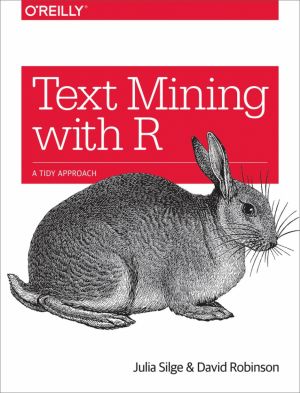Text Mining with R
The authors demonstrate how treating text as data frames enables you to manipulate, summarize, and visualize characteristics of text. You'll also learn how to integrate natural language processing (NLP) into effective workflows. Practical code examples and data explorations will help you generate real insights from literature, news, and social media.
- Learn how to apply the tidy text format to NLP;
- Use sentiment analysis to mine the emotional content of text;
- Identify a document's most important terms with frequency measurements;
- Explore relationships and connections between words with the ggraph and widyr packages;
- Convert back and forth between R's tidy and non-tidy text formats;
- Use topic modeling to classify document collections into natural groups;
- Examine case studies that compare Twitter archives, dig into NASA metadata, and analyze thousands of Usenet messages.
Table of contents
- The Tidy Text Format
- Sentiment Analysis with Tidy Data
- Analyzing Word and Document Frequency: tf-idf
- Relationships Between Words: N-grams and Correlations
- Converting to and from Nontidy Formats
- Topic Modeling
- Case Study: Comparing Twitter Archives
- Case Study: Mining NASA Metadata
- Case Study: Analyzing Usenet Text
| Pages : | 194 |
| Size : | |
| File type : | |
| Downloads: | 146 |
| Created: | 2022-02-03 |
| License: | CC BY-NC-SA |
| Author(s): | Julia Silge, David Robinson |

Warning: Trying to access array offset on false in /home/tutovnfz/public_html/article.php on line 233
Others Computer science Tutorials
Case Studies in Infrastructure Change Management
Others related eBooks about Text Mining with R
Using Adobe Soundbouth CS5This PDF tutorial presents an understanding of key audio concepts helps you get the most out of Adobe Soundbooth CS5,download free training document for intermediat level-users....
Software Architecture PatternsThe success of any application or system depends on the architecture pattern you use. By describing the overall characteristics of the architecture, these patterns not only guide designers and developers on how to design components, but also determine the ways in which those components should inte...
Web content filtering and access deniedLooking for a comprehensive guide on web content filtering and access denied ? Check out the free course offered by MIT Press! This 467-page PDF file provides insights on Internet blocking and filtering practices across the globe. ...
Containerized Docker Application Lifecycle with Microsoft Platform and ToolsDownload free course Containerized Docker Application Lifecycle with Microsoft Platform and Tools, pdf file on 84 pages by Cesar de la Torre....
Android on x86Android on x86: an Introduction to Optimizing for Intel Architecture serves two main purpo..., download free Android tutorial in PDF (380 pages) created by Iggy Krajci ....
iOS Developer Notes for ProfessionalsDownload free course iOS Developer Notes for Professionals, pdf file on 893 pages by Stack Overflow Community....
Games and RulesDownload free course Games and Rules, pdf file on 323 pages by Beat Suter, Mela Kocher, René Bauer....
Gradle SuccinctlyDownload free course Gradle Succinctly, pdf file on 111 pages by José Roberto Olivas Mendoza....
A First Course on Time Series Analysis with SASThis book has been developed for a one-semester course usually attended by students in statistics, economics, business, engineering, and quantitative social sciences. A unique feature of this edition is its integration with the statistical software package SAS (Statistical Analysis System) computi...
Category Theory for ProgrammersCategory Theory is one of the most abstract branches of mathematics. It is usually taught ..., download free Category Theory tutorial in PDF (498 pages) created by Bartosz Milewski ....